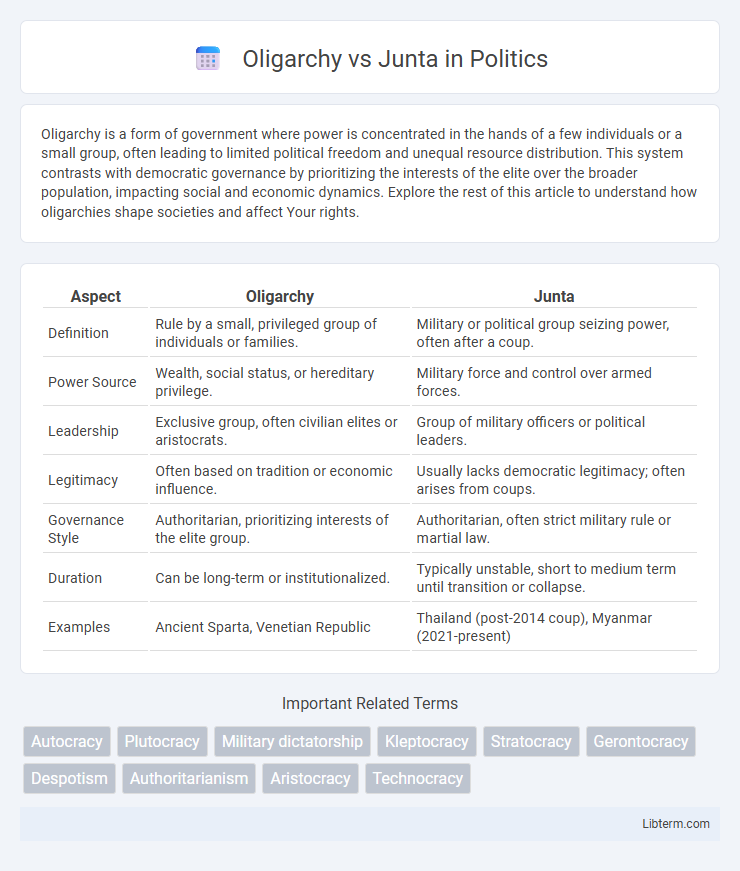Oligarchy is a form of government where power is concentrated in the hands of a few individuals or a small group, often leading to limited political freedom and unequal resource distribution. This system contrasts with democratic governance by prioritizing the interests of the elite over the broader population, impacting social and economic dynamics. Explore the rest of this article to understand how oligarchies shape societies and affect Your rights.
Table of Comparison
| Aspect | Oligarchy | Junta |
|---|---|---|
| Definition | Rule by a small, privileged group of individuals or families. | Military or political group seizing power, often after a coup. |
| Power Source | Wealth, social status, or hereditary privilege. | Military force and control over armed forces. |
| Leadership | Exclusive group, often civilian elites or aristocrats. | Group of military officers or political leaders. |
| Legitimacy | Often based on tradition or economic influence. | Usually lacks democratic legitimacy; often arises from coups. |
| Governance Style | Authoritarian, prioritizing interests of the elite group. | Authoritarian, often strict military rule or martial law. |
| Duration | Can be long-term or institutionalized. | Typically unstable, short to medium term until transition or collapse. |
| Examples | Ancient Sparta, Venetian Republic | Thailand (post-2014 coup), Myanmar (2021-present) |
Introduction to Oligarchy and Junta
Oligarchy is a political system where power is concentrated in the hands of a small, elite group often based on wealth, family ties, or military control, influencing governance and decision-making. In contrast, a junta specifically refers to a government led by a committee of military officers who seize control, typically following a coup d'etat. Both systems centralize authority but differ in composition and methods of power acquisition.
Defining Oligarchy: Key Features
Oligarchy is a form of government where power is concentrated in the hands of a small, elite group distinguished by wealth, family ties, corporate control, or military strength. Key features include limited political participation, centralized decision-making, and policies favoring the ruling minority's interests. Unlike a junta, which is typically a military-led regime emerging from a coup, an oligarchy may operate within established institutions, often maintaining a facade of democracy.
Understanding Junta: Core Characteristics
A junta is a form of authoritarian rule typically established by a small group of military leaders who seize power through a coup d'etat, concentrating control over the state apparatus without democratic legitimacy. Unlike an oligarchy, which can include civilian elites from various sectors, a junta's core characteristics emphasize militaristic governance, hierarchical command, and often the suspension of constitutional processes to maintain order and authority. This concentrated military dominance distinguishes juntas through their reliance on force and strict control mechanisms to govern political and social structures.
Historical Examples of Oligarchies
Historical oligarchies include ancient Athens during its aristocratic rule, where power was concentrated among a few wealthy families controlling political decisions. Venice exemplified a prominent oligarchy through the dominance of its merchant elite in the Doge's council, shaping trade and governance for centuries. The Republic of Genoa also demonstrated oligarchic governance by allowing influential noble families to control maritime trade and political authority.
Prominent Junta Regimes in History
Prominent junta regimes in history include the military juntas of Argentina (1976-1983) and Myanmar, where armed forces seized control to govern through centralized, authoritarian rule. These juntas often dismantled democratic institutions, imposing strict political repression and human rights violations to maintain power. Unlike broader oligarchies, juntas are typically characterized by direct military control and a narrower group of leaders exercising absolute authority.
Power Structure: Oligarchy vs Junta
An oligarchy is a power structure where control is held by a small group of elites, often distinguished by wealth, family ties, or corporate interests, maintaining authority through institutional influence. In contrast, a junta is a government led by a committee of military officers who seize power through force, centralizing control through direct military dominance and often ruling without formal legal legitimacy. While oligarchies rely on established social or economic hierarchies to exert power, juntas exercise authority through coercion and command of the armed forces.
Decision-Making Processes Compared
Oligarchies concentrate decision-making power in the hands of a small, privileged group, often driven by wealth or family ties, resulting in policies that primarily benefit the elite. In contrast, juntas centralize authority within a military or political committee, where decisions are typically made through hierarchical command structures and prioritize maintaining control and stability. The oligarchic decision-making process is characterized by consensus among influential civilian actors, whereas juntas rely on top-down directives enforced by armed forces.
Societal Impact and Public Perception
Oligarchies concentrate power in a small, elite group, often leading to significant wealth disparities and limited social mobility, which fosters public perception of systemic inequality and entrenched privilege. Juntas, typically military-led regimes, impose strict control through force and repression, resulting in societal fear, reduced political freedoms, and widespread human rights abuses. Both governance forms severely impact civil liberties but differ in public acceptance; oligarchies may sustain support through economic influence, while juntas usually provoke resistance due to authoritarian rule.
Legal and International Recognition Differences
Oligarchies, characterized by rule of a small, elite group, often maintain established legal frameworks and enjoy varying degrees of international recognition, especially when their governance appears stable and institutionalized. Juntas, typically formed through military coups, usually lack formal legal legitimacy and face widespread non-recognition or sanctions from international bodies due to abrupt, forceful seizure of power. The distinction in international law hinges on the perceived legitimacy and adherence to constitutional processes, influencing diplomatic relations and foreign policy responses.
Conclusion: Key Differences and Implications
Oligarchy centralizes power in a small group based on wealth, family, or social status, whereas a junta typically consists of military leaders who seize control through force. The stability of an oligarchy often depends on entrenched social hierarchies, while juntas face challenges in maintaining legitimacy without broad institutional support. Understanding these differences highlights how power consolidation impacts governance structures and potential political outcomes.
Oligarchy Infographic

 libterm.com
libterm.com